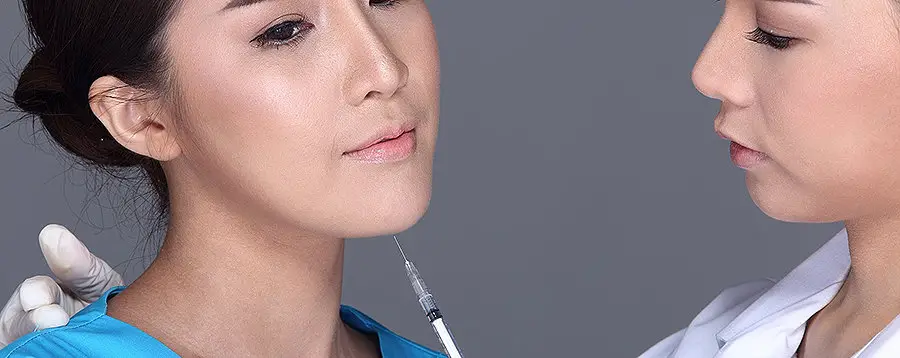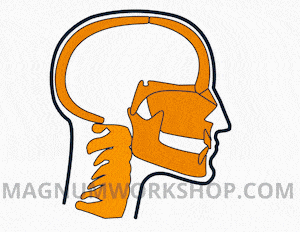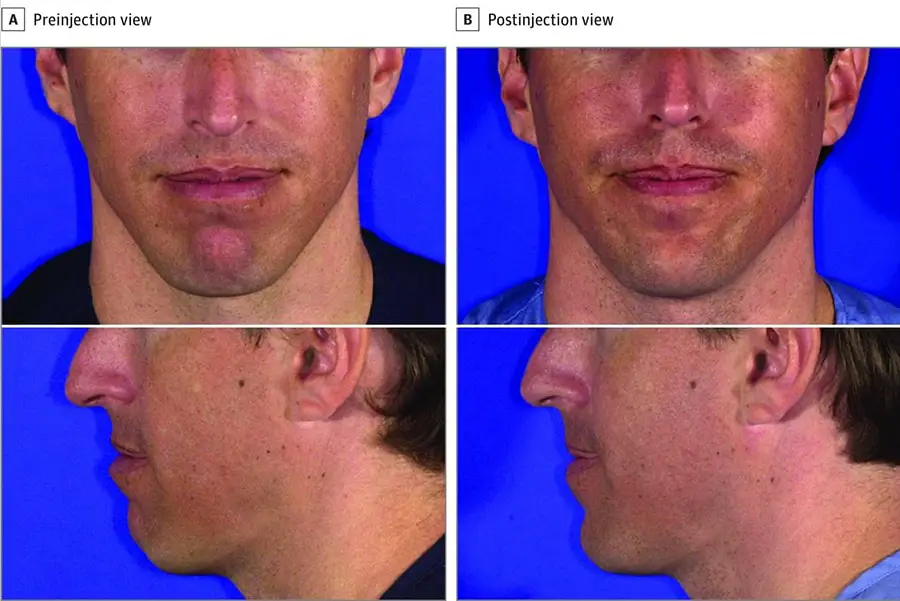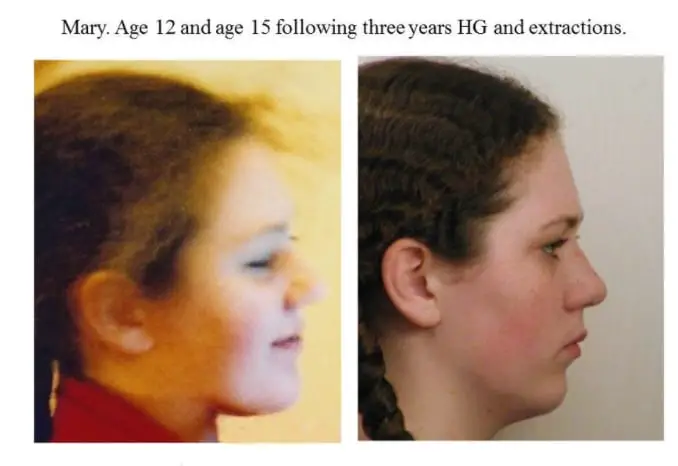
A receding chin, also known as retrogenia, means that your chin doesn’t project outward far enough. This leads to an unattractive facial profile. There are many ways to correct a receding chin, and medical professionals advocate the use of headgear in childhood to keep the mandible in a forward position.
Some ways to fix a receding chin without surgery include botox or injectables such as fillers. Mewing during childhood can also fix a receding chin by guiding proper facial growth.
What Causes a Receding Chin
The chin adds more definition to the face. An ideal chin should be proportional to the whole face and in balance with the other facial features. The mandible is the lower jaw and is responsible for the position of the chin. The appearance of the chin also depends on the tissues surrounding it.
When the chin appears pushed back compared to the position to the upper jaw, this is called retrogenia.
The cause of retrogenia can be two-fold:
- A recessed jaw
- An underdeveloped chin
The main cause of a receding chin is genetics. Normally a recessed chin doesn’t affect the essential functions of the jaw like eating and speech. But infants born with receding chins might need to undergo surgery as this will impair their breathing.
Another reason why people have receding chins is from facial recession caused by bad childhood habits like mouth-breathing, using pacifiers, lack of hard foods, or just poor orthodontic treatment for other issues. This causes our face to lengthen over several years, as displayed below:

Injectable Filler
One way to fix a receding chin is dermal fillers.
Dermal fillers use substances like calcium and hyaluronic acid. These are safe and effective since they are naturally found inside the body. These fillers are meant to add volume and fill in areas. It can also give you a chin that is sharper and softer since it helps in adding more mass to the chin.
For people with a square face, the fillers can add more width to the middle of the face, thus creating a harmonious balance. Fillers can also get rid of dark circles under the eye, add volume to the lips, and eliminates fine lines.
But injectable fillers will never be permanent. Depending on the filler used and how many syringes were utilized, the dermal filler can last for 3-9 months.
You should go to aesthetic doctors known for their skills and experience. This gives you a higher percentage of getting natural-looking results and also prevents future issues.
Keep in mind to lay off on fish oil or anti-inflammatory drugs a couple of weeks before your scheduled filler appointment as these might cause you to have bruises.
Botox
A study by Hsu et al., 2017 showed that botox could actually be used to improve the profile of the chin by helping relax certain muscles:

Botox is a popular cosmetic procedure many celebrities use to get rid of their wrinkles and fine lines. Botox also slims down the jawline and, at the same time, accurately contours the face. This changes your lower facial shape without having to go through cuts and stitches. You also don’t have to worry about the recovery period, as this is shorter than that of surgery.
Botox uses fine needles and depends on how strong your facial muscles are. Botox is injected into muscles and can also treat enlarged masseter muscles, resulting from teeth grinding and excessive chewing.
If you’ve never had botox, you should expect visible results to be noticeable after a couple of injections. It may take up to 60 needles, but the longer you stay with this treatment, the less you’ll need for future treatments.
It will only take a couple of minutes for the whole Botox procedure. After 2-6 weeks, you will notice the changes in your chin. Results will last up to 4-6 months, but this will be dependent on how you use your jaw muscles.
Mewing
Mewing is merely proper tongue posture, which requires your mouth and lips to be closed, molar teeth in contact, and the tongue on the roof of the mouth. Unlike facial exercises, mewing is meant to be done 24/7, and this means it has the potential to alter your bone structure. Aside from having proper oral posture, chewing hard foods also affects your facial development.
To fix a receding chin, mewing should be done from as early of an age as possible. Mewing is most powerful when it’s guiding growth. While adult bones still remodel at a rate of 10% per year, trying to fix your chin with mewing after puberty is going to be an uphill battle and might take years/decades with consistent 24/7 dedication.
For moderate to severe cases of receding chin, keep in mind that mewing can’t cause new bone to grow, and surgery would be the only option.
For more info on mewing, check out our Ultimate Guide. If you doubt that mewing works check out some before/after photos and scientific evidence.
RECEDING CHIN FAQ
What is the impact of the chin on your appearance?
Having a good chin gives you a straight (normal) facial profile and makes your jawline stand out. A wide chin can make you look extremely masculine.
Will exercise help in changing my receding chin?
There is no medical evidence that exercise can help you with getting changes in your receding chin.
Will a massage help improve my receding chin?
Massages will not work for your receding chin. Bringing more blood flow to the chin doesn’t accomplish anything.
Can braces fix a receding chin?
Braces will not help with a receding chin. Braces assists in the proper alignment of your teeth and jaw. If anything, braces might make your receding chin worse if they’re paired with tooth extractions.

Is genetics to blame for my receding chin?
In most cases, having a receding chin is a byproduct of genetics. However, other factors, such as viral infections, poor posture, mouth breathing, and other causes of poor development, will also impact your chin.
Is it considered a bad thing to have a receding chin?
Although experts call a chin that’s receding a “weak chin,”; it only describes how your chin curves toward the neck. A weak chin will not affect your speech, eating habits, or even the ability to socialize with other people.
Can a weak chin still be considered attractive?
Even though a weak chin harms the overall facial proportions, the harmony of the other facial features can easily counterbalance a weak chin, especially if the chin recession is only mild.

